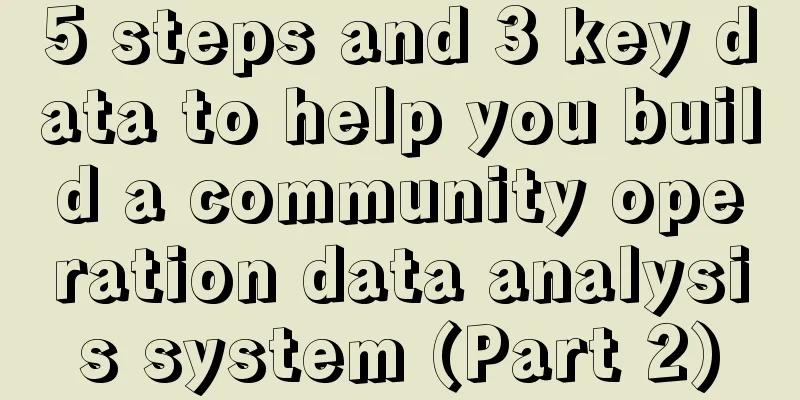3 steps to do a good job of analyzing private circle of friends data

At present, the private domain is in full swing. As one of the important channels to reach private domain users, the effect of good or bad WeChat Moments varies greatly. Excellent WeChat Moments operations can not only improve user retention and interaction, and further improve conversion. It can also screen and identify high-value users and provide better services to them. However, some companies have no shortage of good content output and update frequently, but they still cannot get good results. The reason is that they do not use the right strategies and methods, and do not pay attention to relevant data analysis, so they are unable to make corresponding adjustments and improvements. Below are the three steps to doing good data analysis on Moments. 01 Collect dataCollecting data is one of the most basic steps in the entire data analysis process. To ensure the accuracy of subsequent analysis, it is necessary to ensure that the collected data is sufficiently reliable, accurate and comprehensive. The data collection of Moments is relatively simple. It can be collected manually or automatically through some data collection or third-party tools. It is necessary to record and pay attention to the data changes in the following dimensions: 1. Release timeThat is, the publishing time of Moments. By analyzing the publishing time, you can understand the user’s preferred time and active time for posting Moments, helping you determine the best publishing time to gain better exposure and interaction. 2. Content TypeContent types include text, pictures, videos, etc. By analyzing the content types, we can understand the content types and audience groups that users prefer, so as to develop more targeted promotion content and forms. 3. Column TypeColumn type refers to the classification of different content, such as event information, grass-growing content, brand promotion, knowledge and skills, etc. The proportion can also be adjusted based on the popularity of different types. 4. Number of comments, likes, and interactionsThese indicators are important indicators for measuring user participation and interaction. By analyzing these indicators, we can understand the user's feedback and interaction level on the promotion content, so as to formulate more targeted promotion strategies and content. 5. Transaction amount & number of people who completed the transactionThese two indicators are usually used for friends circles that specialize in conversions to analyze the conversion rate and commercial value of your friends circle. Understanding your users' purchasing intentions and purchasing behaviors can help you evaluate the effectiveness of your marketing strategies. 6. Number of participants and activity conversion rateActivity indicators are different from transaction indicators. They are not necessarily for conversions, but may be for some traffic-generating activities or new product trial activities. They can be used to evaluate the attractiveness and participation of activities, and help you determine which factors can affect participation, so as to better formulate marketing strategies. In the actual operation process, the collected data dimensions can be adjusted according to the company's own situation. The following table is for reference: It should be noted that not every company can accurately track the data on conversion or traffic in Moments. Other forms of evaluation can be used, such as calculating based on the transaction time period of the day, which can provide a rough reference. 02 Data AnalysisAfter collecting the data, we need to summarize these numbers into helpful insights. Usually it is done on a weekly or monthly basis, and you can try to analyze and summarize from the following dimensions: 1) Year-on-year comparison: for example, compare this week’s average data with last week’s average data to analyze the reasons for the increase or decrease; 2) Maximum/minimum value comparison: For example, if a certain Moments data is particularly high, analyze the distinctive points; 3) Trend changes: Select a period of time for analysis. For example, if there is a big promotion during the Double 11 Shopping Festival, check whether the overall data has changed significantly. After having some data conclusions, we can analyze from two scenarios: Scenario 1: Find the cause when the result is knownFor example: The interaction data in the first week of April is the highest. How should we analyze this result? All factors that affect the interaction rate can be broken down: content quality, publishing frequency, topic popularity, publishing time, etc. Then compare the first week of April with the same dimensions of other weeks to find the variables. For example, after analysis, it was found that the content quality and frequency of the first and second weeks of April were very similar, but the release times were different, so the problem is most likely in the release time. Scenario 2: Clarify the analysis objectivesFor example: The sales KPI of WeChat Moments needs to reach 100,000 yuan in May. How to make a corresponding plan? You can start with the few Moments with the highest sales conversion and analyze the reasons for their "high". You can also break down the factors that affect sales conversion: posting frequency, content quality, content type, etc. Then compare it with other Moments to find out the variable factors. For example, the circle of friends with the highest conversion rate contains screenshots of positive customer feedback. You can compare the circles of friends with different content types but the same publishing time and other factors. It is very likely that this type of feedback is easier to convert. It should be noted that it is best to present the analysis results. You can use visualization tools to display the data in the form of charts, such as bar charts, line charts, pie charts, etc. This can show the analysis results more intuitively, making it easier for people to understand and use. 03 Verify the hypothesisBecause the effectiveness of a Moments post is determined by a variety of factors, it is impossible to directly determine from data that it is caused by a single factor. Therefore, after we analyze the relevant reasons in the previous step, we need to further verify the hypothesis through practice. Back to the above question, for example, regarding the reasons why the interaction data was good in the first week of April, we can propose hypotheses and verify them around the reasons why the interaction data improved: 1. Hot content is more likely to arouse user interestThis requires consideration of what your user group profile is like. For example, young people prefer gossip and entertainment hot spots, while older users prefer current political news hot spots. Then, while ensuring that other factors remain unchanged, increase the proportion of hot content. If the interaction data is significantly improved, then this hypothesis is verified. 2. Release the time periodThis requires considering the corresponding scenarios and groups behind this time period. For example, if your user group is mothers, the interaction in your circle of friends will be high at 8 am or 10 pm. Then, you can adjust the frequency of sending during the noon time period while ensuring that the content and image direction remain unchanged, and observe whether the overall interaction data increases. If it is proven to be effective, increase the proportion of posting in the morning or evening. Of course, the examples we give you may be relatively simple. They are mainly to provide you with such an idea. You can proceed according to your actual situation in running your circle of friends. After a long period of data analysis and optimization iterations, I believe your circle of friends data will definitely improve. Final ThoughtsSummarize the three steps of Moments data analysis: Collect data: The dimensions of the data include publishing time, content type, number of comments, number of likes, number of interactions, transaction amount, etc. Analyze data: summarize the data in a certain time unit and analyze the variables that affect it; Verify the hypothesis: Conduct targeted verification through the assumed variable factors, and use the results to correct subsequent operational actions. Author: Yan Tao Source: WeChat public account "Yan Tao San Shou" |
<<: Why do young people love to visit temples?
Recommend
Two development paths for operators
All walks of life and all positions require operat...
Does overseas warehouse delivery require trunk transportation? How to deliver?
There are actually quite a lot of merchants doing ...
Did this generation of young people spend their entire weekend on a 9.9 yuan trial class?
The number "9.9" is as attractive to adu...
Is Huaxizi expensive? Li Jiaqi's failure reflects the decline of the dividends of live e-commerce
Li Jiaqi's live broadcast went wrong, and he l...
Mid-year Thinking Bureau | 5 trend observations and thoughtful suggestions about brands!
The author observes the trend of brands and makes ...
What should foreign traders do if their RMB receipts are frozen? How to solve it?
Foreign trade merchants need to prepare a collecti...
After studying Douyin for 5 years, I found that the influencers who gained followers quickly all played the "sense of contrast" well.
Douyin influencers are ever-changing. Studying the...
Are the prices on Shopee in Taiwan in US dollars? How to get started on the Taiwan site?
If merchants want to settle in Shopee, they have t...
Learn about games: design marketing mechanisms that make users addicted!
There are many people who like to play games. Game...
Targeting 600 million users, Taobao returns to PC, just because of what Jack Ma said?
After seven years, Taobao has made a major update ...
Unveiling Jingxi’s self-operated business: Creating a “Pinduoduo” within JD.com
In the territory of e-commerce giant JD.com, a new...
Earning opportunities based on WeChat groups
This article explores the commercial potential and...
10 thoughts on recent changes
One minute of thinking is worth an hour of nagging...
How to activate Amazon membership? How much does it cost?
When shopping on Amazon, if you are an Amazon memb...
Everyone loves Anthropic
Anthropic, an emerging AI research company, is gra...









